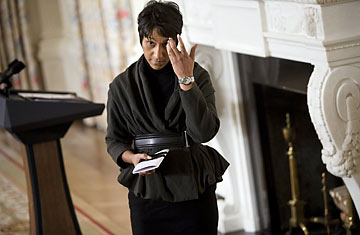
White House social secretary Desirée Rogers leaves after a preview of the state dinner for Prime Minister Manmohan Singh of India
The White House announced Wednesday, Dec. 1, that Social Secretary Desirée Rogers would not be testifying to Congress Thursday about the two reality-television aspirants who got by the Secret Service at a recent state dinner to shake hands with President Obama. "I think you know that based on separation of powers, staff here don't go to testify in front of Congress," said press secretary Robert Gibbs in his daily briefing. "She will not be testifying in front of Congress tomorrow."
The decision is not likely to be contested by Democrats on the House Homeland Security Committee, saving Rogers a potentially embarrassing turn in the hearing-room spotlight. Since Rogers was only invited, not subpoenaed, to testify by the ranking Republican on the committee, New York Representative Pete King, she faces no legal consequences for declining to attend.
But Gibbs' justification for Rogers' absence — invoking the separation of powers — nonetheless raised some eyebrows among legal scholars. "I'd completely fall out of my chair if they invoked Executive privilege with regards to a social secretary arranging a party," said Mark J. Rozell, a public-policy professor at George Mason who recently wrote a book on Executive privilege. "There is no prohibition under separation of powers against White House staff going to Capitol Hill to talk about what they know."
In response to questions from TIME, White House spokesman Nick Shapiro said it was important to keep confidential some internal discussions at the White House. "The job of White House staff must be to provide confidential advice without the threat of having to testify about that advice before Congress, which is why the general rule has long been that White House staff do not appear before Congress," Shapiro said in an e-mail. "This is an aspect of the separation of powers, in the same way that executive branch officials cannot intrude into confidential relationships involving congressional or Supreme Court staff members."
There is, in fact, a long history of presidential advisers testifying about various controversies before Congress, though many Administrations, including Obama's predecessor, also have a long record of fighting such requests. Much of the testimony in recent decades has resulted from major congressional investigations, including the 1970s Watergate break-in and the 1990s Whitewater land deal. In the eight years of the Clinton Administration, dozens of presidential advisers testified before Congress. The list included people like senior adviser George Stephanopoulos, deputy chief of staff Harold Ickes and Maggie Williams, the chief of staff to the First Lady. "While there are some examples of White House advisers testifying before Congress about genuinely historic events," explained Shapiro, "this matter, though serious, doesn't rise to that level."
At President Obama's state dinner last week, two aspiring socialites without invitations, Tariq and Michaela Salahi, were passed through an outer gate at the White House by a uniformed member of the Secret Service. Rogers, who attended the dinner, did not assign members of her staff to check off guests as they arrived, a practice of past Administrations and a fact that led to Rogers' invitation to testify.
The Supreme Court ruled in 1974, in United States v. Nixon, that Presidents maintain a "valid need for protection of communications between high Government officials and those who advise and assist them in the performance of their manifold duties." But this privilege was not determined to be absolute, and it is not clear that Rogers' role as the supervisor of official events at the White House would qualify under the legal standard.
In practice, the issue of staff testimony is usually negotiated between the Congress and the White House, without court involvement. In a 1997 paper for Presidential Studies Quarterly, Congressional Research Service staffer Louis Fisher explained the dynamics. "First, intense and escalating political embarrassment may convince the White House that it is in the interest of the President to have these aides testify and ventilate the issue fully," he wrote. "Second, initial White House resistance may give way in the face of concerted congressional and public pressure."
The fact that the White House doesn't believe that Rogers needs to testify does not mean it doesn't recognize that something went wrong in the now notorious gate-crashing episode. On Wednesday, the White House released a memo from deputy chief of staff Jim Messina that concluded, "the White House did not do everything we could have done to assist the Secret Service in ensuring that only invited guests enter the complex." As a result, the White House has changed its practices, particularly with regards to the role of the social secretary, whose staff will now be physically stationed at the checkpoints with Secret Service to check off arriving guests and deal with problems.
As for the actions of Rogers and other White House staff last week at the state dinner, Messina concludes that improvements can be made. "White House staff were walking back and forth outside between the checkpoints helping guests and were available to the Secret Service throughout the evening," he wrote, "but clearly we can do more, and we will do more."
